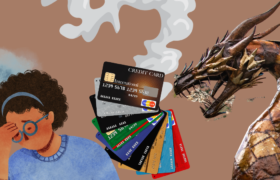Credit cards, those little squares of plastic that we carry around with us, have changed the way we pay for things and handle our money. Even though they are very convenient, they also pose a number of risks that could hurt our finances and even our mental health. This blog post will talk about the different risks that come with credit cards, how they affect people emotionally when they don’t pay their bills on time, and how important it is to use them responsibly.
Credit Cards: The Dangers
Getting into debt: This is probably the most common risk of credit cards: they can cause people to get into debt. Because it’s so easy to use a credit card, people may spend more than they mean to. If the amount isn’t paid off in full every month, interest starts to build up and quickly becomes a big problem.
High Interest Rates: Credit cards often have high interest rates, which makes it hard to get out of debt. When you keep a balance for a longer time, you pay more in interest, which can slow down your financial progress.
Lots of Fees: Credit cards aren’t just for buying things; they also come with a lot of different fees. Some of these are yearly fees, late payment fees, and foreign transaction fees, all of which cost you money.
theft Vulnerability: Credit cards can be used to commit theft. If you lose or have your card stolen, someone else could use it to make purchases without your permission, which could hurt your credit score and financial security.
The Mindset of Defaulters: Effects on Mindset
Not making credit card payments on time can be bad for your mental and physical health:
Shame: Defaulters often feel bad about their financial situation, which makes them not want to talk about it with other people.
Guilt: Feelings of letting down loved ones and creditors can lead to feelings of extreme guilt.
Anxiety: Not knowing if you can pay back your debts and how they will affect your finances in the long run can cause anxiety.
Depression: Long-term stress about money can make you feel lost and depressed, which is bad for your mental health as a whole.
ideas of Suicide: In the worst cases, people who don’t pay their credit cards may even have suicidal ideas, which shows how bad financial problems are.
Stress in the mind and its effects:
Financial worry, which is often caused by credit card debt, can have serious effects on mental health, causing problems like anxiety, depression, trouble sleeping, and trouble focusing. Also, it can hurt your relationships and your sense of self-worth.
Recovery Efforts and Harassment
Not making credit card payments on time can lead to constant collecting efforts:
Phone Calls: Credit card companies may call people who haven’t paid their bills for days on end, even on holidays, which can add to their stress and anxiety.
Visits from Recovery Officers: Credit card companies sometimes send recovery officers to the homes of people who haven’t paid their bills on time, which can be embarrassing and scary.
Consumer Protection and Government Role:
The government is very important for keeping people safe from the risks of credit cards:
Governments impose restrictions on predatory lending practises and require credit card companies to give users information.
Resources: Government organisations, like the Consumer Financial Protection Bureau (CFPB), provide resources, such as debt management plans, to help people who are having trouble paying off their credit card debt.
Taking Care of Yourself:
To keep yourself safe from the risks of credit cards, think about these ideas:
Responsible Usage: To avoid getting into debt, only charge what you can afford to pay off in full every month.
Awareness: Know what your credit card costs and interest rates are.
Vigilance: Carefully check your credit card statements and report any suspicious behaviour right away.
Seek Help: If you’re having trouble paying off your credit card debt, talk to a qualified financial advisor or counsellor about your choices.
Emotional Well-being: If stress over money makes you feel bad, don’t be afraid to get professional help or connect with people who can help.
Credit cards are like two-edged swords: they’re very convenient, but they also pose big risks if they’re not used properly. Responsible use, learning about money, and getting help when you need it can help people avoid these problems and still enjoy the benefits of credit cards without getting into financial trouble. Don’t forget that your mental and financial health are the most important things in your life, and there are ways to protect both.



